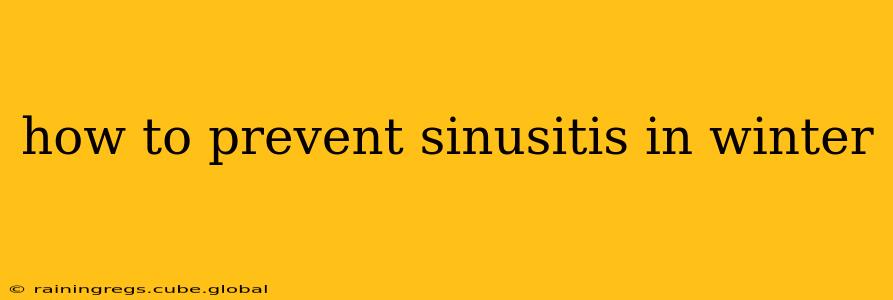Winter's cold, dry air and the increased prevalence of respiratory viruses create the perfect storm for sinusitis to flare up. Sinusitis, the inflammation of the sinuses, can cause significant discomfort, including facial pain, pressure, congestion, and headaches. While you can't completely eliminate the risk, proactive measures can significantly reduce your chances of developing sinusitis during the winter months. This comprehensive guide explores practical strategies to keep your sinuses healthy and happy throughout the colder seasons.
What is Sinusitis and Why is Winter a High-Risk Season?
Sinusitis is the inflammation of the tissue lining the sinuses – air-filled spaces behind your forehead, cheeks, and nose. This inflammation can be caused by viral, bacterial, or fungal infections, or by allergies. Winter presents a heightened risk due to several factors:
- Dry air: Cold, dry air irritates the nasal passages, making them more susceptible to infection. The dryness hinders the natural cleansing mechanisms of the sinuses, allowing irritants and pathogens to linger.
- Viral infections: Winter is peak season for colds and the flu, both of which can trigger sinusitis. Viral infections weaken the immune system, making you more vulnerable to secondary bacterial infections that can worsen sinusitis.
- Indoor environments: We tend to spend more time indoors during winter, increasing exposure to recirculated air, potential allergens like dust mites, and other irritants that can aggravate sinuses.
How to Prevent Sinusitis in Winter: Practical Strategies
Here are effective strategies to minimize your risk of sinusitis during the winter:
1. Stay Hydrated: The Foundation of Sinus Health
Drinking plenty of fluids, especially water, thins mucus, making it easier to drain and preventing congestion. Aim for at least eight glasses of water a day. Warm water with lemon can be particularly soothing.
2. Use a Humidifier: Combatting Dry Air
Dry air is a major contributor to winter sinusitis. A humidifier adds moisture to the air, preventing nasal passages from drying out and becoming irritated. Regularly clean your humidifier to prevent mold growth.
3. Saline Nasal Spray or Rinse: Natural Cleansing
Saline nasal sprays or rinses help flush out irritants, allergens, and mucus from your nasal passages, keeping your sinuses clear. Use a sterile saline solution and follow instructions carefully.
4. Manage Allergies: Identifying and Addressing Triggers
If you have allergies, winter can still present challenges. Indoor allergens like dust mites and pet dander can trigger sinusitis. Maintain a clean home environment, use air purifiers, and consider allergy medications as prescribed by your doctor.
5. Boost Your Immunity: A Proactive Approach
A strong immune system is your best defense against infections. Ensure you get enough sleep, eat a balanced diet rich in fruits and vegetables, and consider incorporating immune-boosting supplements like Vitamin C and zinc, after consulting with your doctor.
6. Avoid Irritants: Protecting Your Sinuses
Limit exposure to smoke, pollutants, and strong smells. If you experience sensitivity to certain scents, take extra precautions to avoid them during winter.
7. Practice Good Hygiene: Preventing the Spread of Infection
Wash your hands frequently, especially after touching public surfaces, and avoid touching your face unnecessarily to prevent the spread of viruses and bacteria.
8. Proper Sleep: Rest and Recovery
Adequate sleep is crucial for immune function. Aim for 7-9 hours of quality sleep per night to support your body's natural defenses.
What are some home remedies for sinusitis?
Many people find relief from sinusitis symptoms using home remedies. These can include:
- Warm compresses: Applying warm, moist compresses to your forehead and sinuses can help relieve pain and pressure.
- Steam inhalation: Inhaling steam from a bowl of hot water can help loosen mucus. Add a few drops of eucalyptus or peppermint essential oil for added relief. Always exercise caution when using hot water to avoid burns.
- Elevating your head: Sleeping with your head elevated can help drainage and reduce congestion.
When to See a Doctor
While these preventative measures can significantly reduce your risk, it's crucial to seek medical attention if you experience persistent or severe sinusitis symptoms, such as high fever, severe facial pain, or green or yellow nasal discharge. These could indicate a bacterial infection requiring antibiotics.
Conclusion: Proactive Sinus Care for a Healthy Winter
By implementing these strategies, you can proactively protect your sinuses from winter's challenges. Remember that prevention is key, and adopting a holistic approach to health – encompassing hydration, hygiene, and immune support – will significantly improve your chances of enjoying a comfortable and sinusitis-free winter. Always consult your doctor or healthcare provider for personalized advice and treatment.
